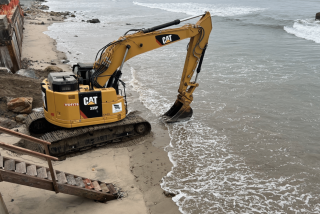Civil trial over public access to beloved Martin’s Beach gets underway
- Share via
Reporting from Redwood City, Calif. — A civil trial over a beloved beach that the public can no longer access got underway Thursday, with plaintiffs painting billionaire landowner Vinod Khosla as a scofflaw who violated the California Coastal Act when he barred the private road to Martin’s Beach without seeking a coastal development permit.
The nonprofit Surfrider Foundation contends that the act of locking the gate, painting over a billboard that had welcomed the public and hiring security guards changed the “intensity of use” of the beach south of Half Moon Bay and therefore required a permit.
San Mateo County planning officials told Khosla the same thing five years ago, records show, as did a judge who tossed out a separate lawsuit filed by the venture capitalist’s limited liability companies, or LLCs, against the county and Coastal Commission, saying he had to first go through that administrative process.
Eric Buescher, outside counsel for Surfrider, told San Mateo County Superior Court Judge Barbara J. Mallach in his opening statement that the organization filed the citizen enforcement action “on behalf of the public — those who used to visit Martin’s Beach and are no longer able to and those who never had the opportunity.”
The 1976 act, he added, “requires [that] landowners in the coastal zone ask for permission prior to engaging in development. It is not a statute that allows people to do what they wish and then ask for forgiveness or plead ignorance later.”
Attorneys for Khosla’s two LLCs — which control the land — countered that their client as a private property owner had every right to lock the gate and bar the road that visitors had previously used to get to the beach by permission of the prior owner, and that the actions he took did not require a permit.
“Evidence will show that my client never engaged in any development,” said Jeffrey Essner. “Access is not development.”
The non-jury trial is expected to conclude next week.
Though a ruling against the landowner would not force the gate open, Khosla would have to submit to a lengthy regulatory process and could face millions of dollars in fines.
The case is the latest standoff between a wealthy private owner of California coastal property and state regulations that call for scrutiny of changes in coastal use to ensure that public access is not dramatically reduced.
The property was owned for nearly a century by the Deeney family, who allowed the public to drive (or stroll) down private Martin’s Beach Road and pay a nominal fee for parking. Its white sand beach was promoted in state coastal guidebooks as ideal for children and the elderly. A billboard featuring the bay’s signature rock, shaped like a shark’s tooth or fin, beckoned from Highway 1: “Enter.”
Then, in 2008, Martins Beach LLC 1 and Martins Beach LLC2 purchased the property from the Deeneys for $37.5 million. New management continued to allow access — for a higher parking fee — but in 2010 locked the gate and painted over the billboard, and in 2013 hired security guards.
Khosla’s attorneys initially declined to disclose or confirm his identity and in a letter asked the Surfrider Foundation to “protect his privacy,” noting that partners in LLCs customarily choose to remain anonymous. But members of the volunteer Surfrider Foundation drew attention to Khosla, pointing out that the co-founder of Sun Microsystems is now known for his green investments.
Khosla did not attend Thursday’s proceedings.
Another San Mateo County Superior Court judge ruled in his favor last fall in a separate suit on behalf of “Friends of Martin’s Beach,” which alleged a right under the California Constitution of public access to the beach.
Judge Gerald G. Buchwald said there was no right of public access to the property because it is traceable back to a Spanish land grant and is held by a U.S. Land Patent.
Essner pointed to Buchwald’s ruling as evidence that his client had a right to lock his gate.
“He does not need permission from the Coastal Commission to close an existing gate on his property, where there are no access rights that exist by law,” he told Mallach.
However, Buchwald specifically noted that his decision “does not disturb, in any way … the authority of the California Coastal Commission to make real estate development permits subject to some public access.”
Essner also told Mallach that Khosla and his legal counsel were awaiting an enforcement action by the Coastal Commission so they could challenge it in court — not intentionally defying the law.
Mallach on Thursday also rejected Essner’s attempts to fight a subpoena of Khosla. Though Khosla’s attorneys argued that the LLCs’ professional manager made all decisions about beach closure so their client has no meaningful information to share, Mallach ruled that plaintiffs can put him on the stand on Monday.
More to Read
Sign up for Essential California
The most important California stories and recommendations in your inbox every morning.
You may occasionally receive promotional content from the Los Angeles Times.











